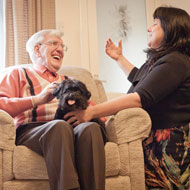
Community ‘Dog Day’ events to help dementia sufferers
The Dementia Dog Project, a collaborative project run by Dogs for Good and Alzheimer Scotland, has received a £314,002 grant from the Big Lottery Fund. The grant will allow the partnership to expand their work, from an individual assistance dog approach to support those living with dementia, in a community setting.
The therapy, offered by Dogs for Good and Alzheimer Scotland, is known as Animal Assisted Intervention (AAI) and is lesser known in the UK, in comparison with other parts of the world. The new funds will go towards a pilot scheme of ‘Dog Day’ community events, as well as goal-focused therapy intervention pilots across Scotland and specific areas of England.
The pilot scheme will involve specialist trainers and therapy dogs working together with support workers and health care professionals. Advanced training for the community dogs will take place at the open prison, HMP Castle Huntly, which also acts as the operational base for the Dementia Dog Project. Those in custody at the prison are encouraged to work with the dogs, which allows them to gain valuable professional skills whilst also helping to provide highly-trained dogs for dementia sufferers.
The preliminary trials will benefit over 500 people living with dementia, with assessment of the scheme focusing on mental wellbeing and financial benefits of both sufferers and their carers. Volunteers in the community will also get involved, attending training sessions with their pet dogs, in trial areas. This addition will allow the charity partnership to develop new training standards and test the effectiveness of large scale teaching mechanisms for the future.
Maureen McGinn, chair of the Big Lottery Fund Scotland, said: “There is evidence which shows that dementia assistance dogs can help people with dementia and their families live more fulfilling, independent lives. So we are delighted to be able to fund some of this work in Scotland and I look forward to hearing more about the development of this pilot over the coming months as it plans to expand into England too.”
Chief executive of Dogs for Good, Peter Gorbing, said: “This grant will allow the Dementia Dog Project team to test and pioneer new approaches to reduce social isolation and bring joy and meaning into the lives of people with dementia. Through our work training dementia assistance dogs, we have seen the positive contribution that dogs can make to people’s lives. This boost in funding for the Dementia Dog project will help us to reach even more people living with dementia in the community.”
Image © Clark James Digital



 The Veterinary Medicines Directorate (VMD) is inviting applications from veterinary students to attend a one-week extramural studies (EMS) placement in July 2026.
The Veterinary Medicines Directorate (VMD) is inviting applications from veterinary students to attend a one-week extramural studies (EMS) placement in July 2026.